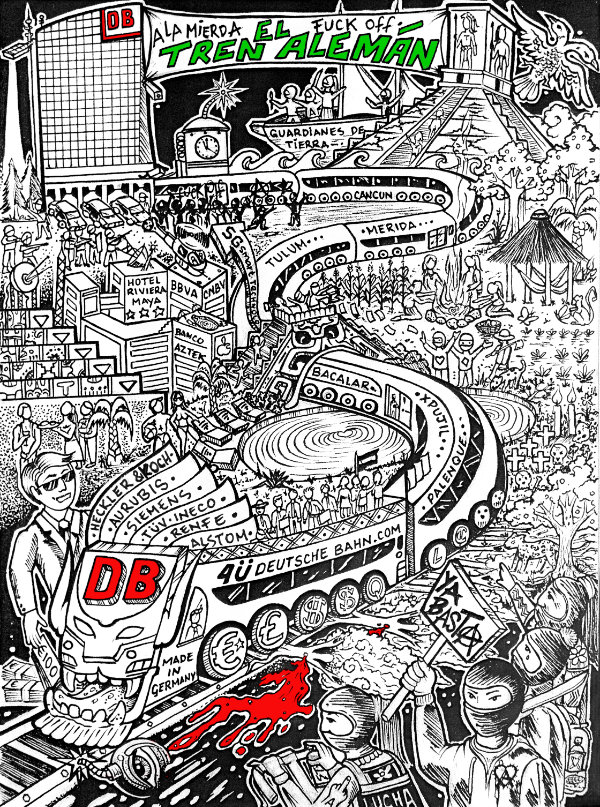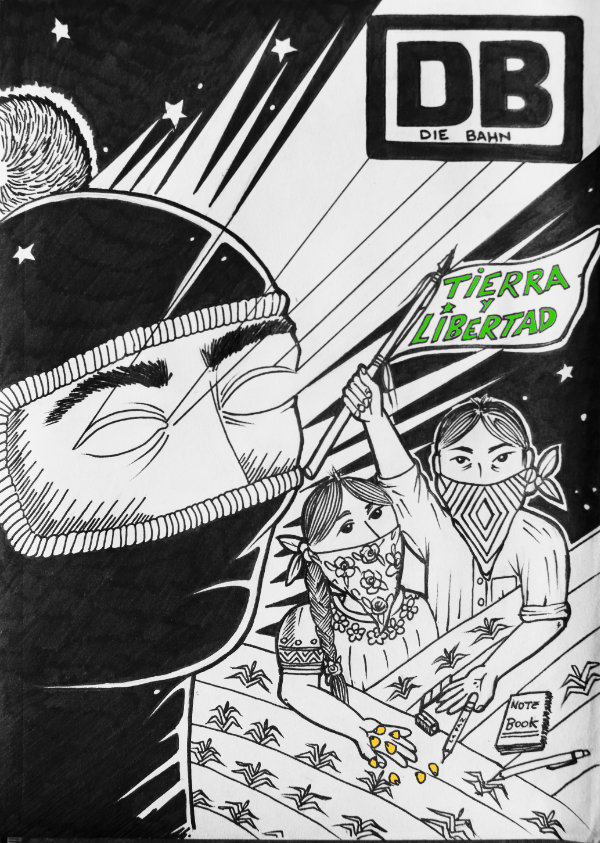German version: Tren Maya Made in Germany – Die gesamte Recherche (DE) 2022
Spanish version: Tren Maya Made in Germany – La investigación completa (SP) 2021
A research on the participation of German and european companies in the Tren Maya-Project
Download
- Tren Maya – Made in Germany – The entire investigation – (EN) 2021
- Tren Maya – Made in Germany – Short version and summary / Flyer – (EN) 2021
- Press Release Tren Maya Made in Germany – Deutsche Bahn and the Train of Destruction (DE) 2021
Infrastructure projects do mean progress and development, according to the official discourse. Yet the “Tren Maya” project only appears at first glance to be a harmless project of the Mexican government: the new route is to connect five federal states over a distance of more than 1,500 kilometres. Politicians and companies promise jobs, an increase in tourism and even the road to modernity. In reality, the mega-project means the destruction of the last rainforests in southern Mexico, disregard for the rights of the indigenous population, land grabbing and displacement as well as additional militarisation in one of the most conflict-ridden regions of the country. On the other hand, a few are hoping for big profits and are pushing ahead with the realisation of the “Tren Maya”.
German capital and German companies are also involved in the planning, construction and commissioning. The research takes the journey of the Zapatistas* and the CNI* through Europe as an opportunity to describe the consequences of the project, to show the involvement of DB Consulting & Engineering, the interest of Siemens and TÜV Rheinland as well as the connection to German arms companies. At the end, the report concludes with the presentation of the resistance against the project and an interview with Dr. Sergio P. Díaz, who as a researcher at the University of Campeche has been observing the project on the ground for years and investigating its geopolitical dimension.
He emphasises: “The biggest mistake is to see the `Maya train’ only as a train.”


Summary of the research
General information
The so-called “Maya Train” (Tren Maya) is an infrastructure project in southeastern Mexico that will cover a 1,500-kilometre stretch from Palenque to Cancún, connecting the states of Chiapas, Tabasco, Campeche, Yucatan and Quintana Roo. It will supposedly boost the (local) economy and tourism and cost about 150 billion pesos (over 6 billion euros). At the same time, the Tren Maya is accompanied by the expansion of the highway infrastructure. The very fact that this and other mega-projects are to be under the leadership of the Mexican army suggests disturbing motives behind the Tren Maya. The catastrophic effects for people and nature have always been concealed.
Environmental destruction
The extent of environmental destruction can hardly be fully depicted for the vast area. “Studies conclude that the Maya train will lead to the degradation, fragmentation and deforestation of twenty-three protected natural areas, including [UNESCO] World Heritage Sites,” says Greenpeace Mexico. For the first phase of construction alone, 11 million trees will be cleared. Underwater cave systems with cultural significance for the indigenous population are endangered by the construction – while other ecosystems depend on the water flows there. In addition, the country’s largest groundwater resources are threatened. An environmental impact assessment was carried out with flaws and without the involvement of indigenous peoples:
Disregard for indigenous rights and threats to activists*.
“The indigenous consultation process on the Maya train did not meet all international human rights standards,” said the UN Office of the High Commissioner for Human Rights. “[Consultation processes are] often conducted in contexts of threats, criminalisation and harassment, which undermines their free character,” the UN Committee against Racial Discrimination points out.
At the same time, activists who speak out negatively against the project put their lives in danger. Those who spoke out against the Tren Maya received death threats, reports the NGO Front Line Defenders. Twenty-three human rights and land defenders were killed in Mexico last year alone. Mexico is thus one of the most dangerous countries for activists*.
Militarisation and migration
The Mexican army is supposed to manage a large part of the Tren Maya and also receive profits from the project. At the same time, this transfer of powers to the armed forces means the further militarisation of one of the country’s most conflict-ridden regions: In the southern state of Chiapas, the Mexican army has been waging a “low intensity” war against the autonomous communities of the Zapatistas for years. The Mexican government’s increasingly aggressive approach to refugees from all over Central America, carried out by the military, is also closely intertwined with the project: “If you put the various mega-projects and infrastructure projects on the map, you see that they are building blocks for a ‘migrant barrier’ to serve US geopolitical interests,” says Dr. Sergio Prieto Díaz, a lecturer at the Colegio ECOSUR.”
Urbanisation and opening up to (global) capital:
The project is the gateway for military, state and (global) capital and threatens to permanently destroy the previous way of life and culture of the affected population, based on subsistence farming and common property.
DB Consulting & Engineering – Shadow Operator
As a so-called shadow operator, the DB subsidiary is active in Qatar, the United Arab Emirates, China, Brazil or Colombia, among other places. In Mexico, DB, as part of a consortium with two other state-owned companies from Spain, has secured the contract to accompany and advise on the project. “FONATUR, [the agency] of the Mexican Ministry of Tourism, [has] contracted DB Engineering & Consulting GmbH to advise on railway operational decisions within the “Tren Maya” project. […] The contract was concluded on 1 December 2020 and runs until December 2023, with a contract value of 8.6 million euros,” confirmed german Parliamentary State Secretary Ferlemann.
The fact that hardly a word is said about the participation on the part of DB, at least in Germany, may have to do with DB’s green image and climate-friendly external presentation. While a green stripe has been added to the red stripe of the well-known ICE trains since 2019, the climate and environmental friendliness proves to be a lie and a colonial outsourcing: a quarter of all German rail electricity is supplied from the Datteln IV coal-fired power plant. Coal from Colombia is burned there, where people are displaced and murdered in order to mine and export the “blood coal”. When DB “officially” consumes green electricity, it is purchased certificates – just another facet in DB’s enormous greenwashing world.
SIEMENS Mobility – It would be a privilege to become part of the Tren Maya
SIEMENS already offered a stake in the Tren Maya project in 2018, from power generation and transmission, electrification, signalling and automation to the trains themselves. The interest continues in 2021 – and despite initial awards to the French company Alstom. In March 2021, changes in the tendering process (undertaken by the Mexican tourism authority FONATUR) were reported. Several international corporations, apparently wishing to secure awards for further sections, then asked the authority to extend the deadline for submitting the required documents in the tender process, as the three-month deadline was impossible to meet – including SIEMENS.
TÜV Rheinland – certificates of misery
Just like SIEMENS, the German company TÜV Rheinland showed interest in the Tren Maya project back in 2018 and offered to participate even before more concrete plans or studies on environmental issues were available. The tasks TÜV Rheinland is available for in the Tren Maya project seem similar in scope to those of DB or SIEMENS: TÜV Rheinland Rail Mexico’s business development director Sandra Alamo “[said] [in 2018] that they [TÜV] can participate from the pre-conception of the project, pre-feasibility, feasibility, development of materials and everything that is necessary, to the testing and execution of the works.” The “Technical Supervision Service” has undertaken similar tasks in Mexico for Metro Line 12 in Mexico City, which collapsed in May 2021. More than 20 people were killed. The TÜV also carries out questionable inspections outside Mexico. A dam collapse in Brazil killed over 250 people after TÜV Süd declared the dam safe.
The German arms industry and the Tren Maya
When describing the involvement of German companies in the Tren Maya project, one must not forget actors who only at first glance have nothing to do with the project. The Mexican armed forces, which are to manage the entire infrastructure project and receive the profits, are a frequent customer of European, and especially German, arms companies. Although corporations like Heckler & Koch are involved in illegal arms deals with Mexico, the German government approved arms exports to the country again last year. A large part of the German weapons go to particularly militarised regions, such as Chiapas, where the military is present in many bases around the autonomous areas of the Zapatistas.
The ILO 169 Convention
Convention 169 of the UN’s International Labour Organisation (ILO) is the only international legal system for the protection of indigenous rights. At the heart of ILO Convention 169 are the consultation and participation procedures to ensure participation and voice of indigenous peoples in projects that affect them. Germany ratified the convention on 15 April 2021, after decades. As Deutsche Bahn is a state-owned company, we demand the consistent implementation of the ILO agreement and thus an exit of DB and its subsidiaries from the Tren Maya project!
Let us act together. Stay tuned to:
#NoAlTrenMaya #StopTheMayanTrain


